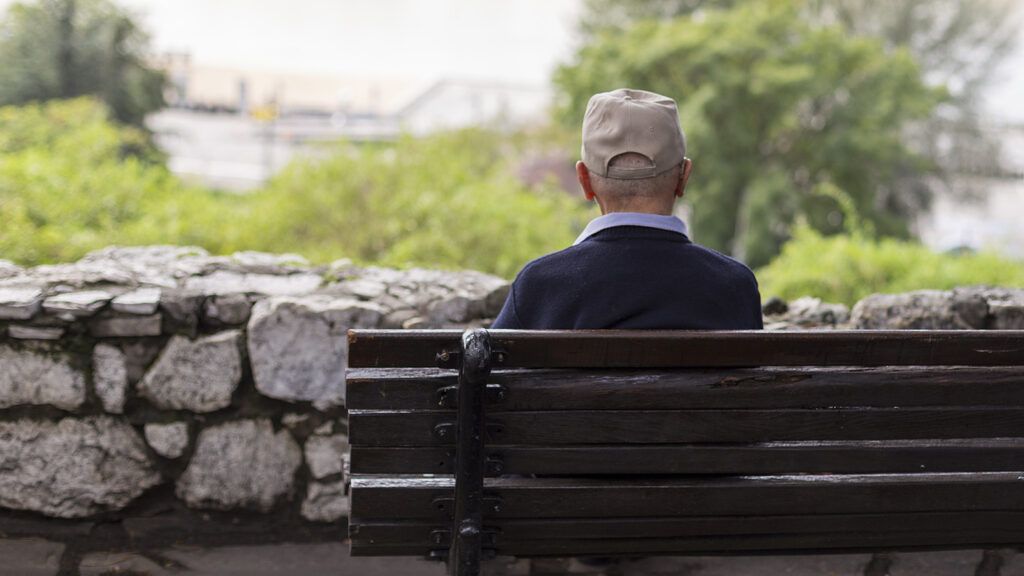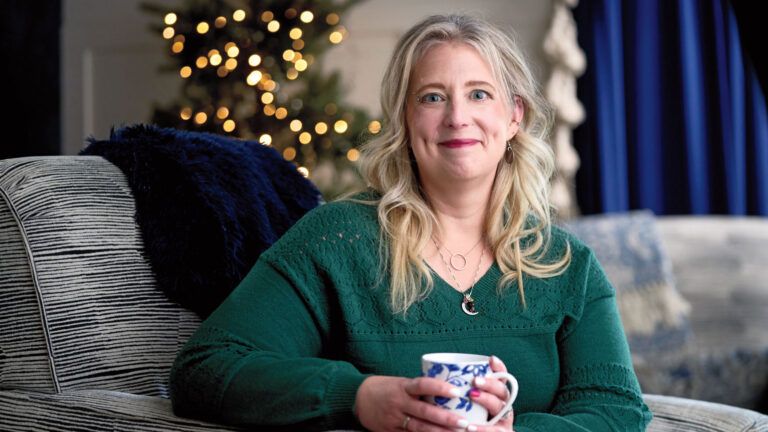My wife, Barbara, and I had been married more than 50 years when she was diagnosed with inoperable pancreatic cancer in October 2010. I was devastated.
Even though I had been a professional athlete—a forward in the American Hockey League—in my younger days, Barbara had always been the healthy one (at age 72, she still jogged daily), the steady one, the one who never missed a day of work. I was seven years older and I used to joke that I would be long gone before her. But here the doctor was telling us that she had only three to six months left.
I couldn’t bear to think about life without Barbara. We came home from the cancer center and went back to our daily routine—reading the Bible and talking over coffee in the morning, taking an hour-long walk together later in the day—but it would never be the same again. I had difficulty talking with her because I just wanted to cry.
I prayed many prayers for her to be healed. But her health declined rapidly. Soon our walks dwindled to 20 minutes. Then Barbara stopped walking altogether. Our oldest daughter, Ann, took unpaid leave from her job as a nurse to care for Barbara.
One day Barbara asked us to stop praying for a healing and start praying for a quick passing on. Sadness overtook me, yet I couldn’t help noticing a complete peace in her eyes.
It was then that I remembered the dream Barbara had told me about a year before her diagnosis. She had dreamed that she was in a high place looking down on a clear river. She saw a calendar moving swiftly in the river. “What do you think it means?” she’d asked me.
“Did you see a date on the calendar?”
“No, it was moving too fast,” she said.
The dream had fascinated her, and she would talk about it from time to time, trying to puzzle out its meaning.
Now I understood what her dream meant. The calendar represented her life passing through time, moving swiftly toward her earthly end. Heaven, with its crystal-clear river as described in the Book of Revelation, was just ahead. And she was looking forward to being there.
In her final moments, I kissed her and said, “I love you.” Tears flowing, I read Psalm 23. As I came to the last line, “I will dwell in the house of the Lord forever,” Barbara glanced up and whispered, “Amen.” A smile crept across her face, and she entered heaven’s door.
I knew Barbara had gone to be with the Lord, but I felt so empty and lost. We had been true partners in life, even though we were very different. I was an outgoing optimist; Barbara was more of a cautious realist. That was probably why she didn’t like me at first.
We’d met at a Pennsylvania restaurant. I was there with my teammates from the AHL’s Hershey Bears. Barbara, a secretary, was having lunch with colleagues from the Hershey Chocolate Corporation. She was the most beautiful woman I’d ever seen. I knew I couldn’t let her leave without talking to her. So I walked up and introduced myself. I told her I played for the Hershey Bears. Barbara knew nothing about hockey and wasn’t impressed by my job or my bravado. But I persisted and, in the course of two years of dating, won her over.
Barbara and I married in 1959. She was thrust into hockey, a sport she didn’t grow up with as I had. I came from a small town in Canada known for producing pro hockey players. I started skating at five. I loved hockey so much that everything else, including school, took a back seat. I dropped out and signed with a junior league team. In 1952, at 21, I made my professional debut with the Pittsburgh Hornets.
There were practices in the morning, team meetings in the afternoon, games at night. There were road trips and media coverage. There were one-year employment contracts that could expire with one serious injury. There were all these Canadian characters like me with big egos who liked drinking beer. That was life in the AHL, a life outside Barbara’s comfort zone.
Yet she adapted. She left her job, following me as I signed with different teams. Hockey often took me on the road, and Barbara took care of our four children and our off-season home in Canada. I played 20 years in the AHL, retiring as the league’s all-time leader in goals, assists, points and games played.
We settled near Buffalo, New York. I managed a sports arena, which kept me connected to the game I loved. Barbara worked in customer service for Ivaco, a manufacturer of steel products. We had date nights every week. Our kids were thriving, though Ann missed Canada. One day Barbara and I found a note on the kitchen table, saying, “I’m running away.” We’d had no idea Ann, only 17, was so unhappy.
Finally Ann called. She and her boyfriend had hitchhiked to California. She called us every few weeks to tell us about her new life. She was staying at her boyfriend’s relative’s home, where she’d met a woman who introduced her to the Bible and to talking to God about salvation. Ann got a job and seemed to be doing fine. What could I say? I’d left home to play hockey when I was her age.
Ann started sending us Christian tracts. Barbara and I didn’t know what to make of them. Though we considered ourselves Christians, we didn’t even own a Bible back then. About a year after Ann ran away, a way opened for her to see me in Hollywood, California.
Ann and her friends met me in my hotel room. She looked happier, more peaceful and more confident than ever before. Ann and her friends read from the Bible and talked to me about Jesus. Then they asked me to say a prayer of faith. I fell to my knees and invited Jesus Christ into my life. There were no bells or whistles or angelic music, but I knew something monumental had happened. For the first time, I felt God’s presence, something stronger than even hockey or my marriage.
At age 51, I started reading the Bible. And God changed everything as only he can. I became more of a giver and less of a taker. I stopped judging people and began to love them instead. Barbara was put off by my new faith but surprised by these changes in me. What really shocked her was when I quit drinking. I liked my beer and could never stop at just one. Then one day I walked into my favorite bar and ordered a beer. I’d only drunk a quarter of the bottle when I felt a deep conviction that I should pay the bill and walk out. I haven’t had a drink since.
Barbara connected the changes in me with the Bible and secretly began reading it. I had no idea until the day she embraced me, sobbing, and confessed she needed Jesus in her life. After that, we became partners in faith as well, growing closer than ever.
In 1999, with our children grown, we moved to Georgia for Barbara’s job. She confidently assumed the role of breadwinner while I took on all the domestic work. I felt awkward in my new role (and my cooking was less than stellar) but like a winger covering for a rushing defenseman, I wanted Barbara to know I had her back.
Then something really strange happened. I found myself drawn to—of all things—poetry. I was sitting next to our grandfather clock, reading the Bible, when these words bubbled up to the rhythm of the ticking clock:
Tick, tock, the clock is ticking, ticking away,
The Lord is coming; He’s on His way
He’s coming soon, and He will have His say
On Judgment Day, on Judgment Day.
Words kept cascading into my mind. I ended up writing seven stanzas. Barbara typed up the poem for me. We both thought it was a onetime thing.
But poems kept coming to me. Barbara edited them and typed them up. We put the poems together into two collections of Christian poetry. But what was I supposed to do with them? One night I asked, “Lord, how can I use these poems to spread your message?”
The next morning, I was led to a nearby nursing home. I asked to speak with the activities director. “I’d like to begin a ministry for your senior citizens,” I told her, showing her my poems. She said, “We actually have a group already assembled and waiting for an activity. Can you meet with them now?”
She brought me to the room. I looked at the dozen senior citizens, deeply moved. They were in their last years, and God had chosen me to help guide them. I ended the session with a prayer of salvation. Many of them joined in.
That was only the beginning. I expanded my ministry to other nursing homes in the area, and when Barbara and I moved back to Hershey after her retirement in 2004, I brought my ministry to nursing homes there. All through Barbara’s illness, she urged me to continue my work, and I never missed a day.
Perhaps that was why, after her death, something told me to stick to my daily routine. Ann, who had extended her leave to stay with me, helped by having coffee with me in the morning and going for walks with me in the afternoon.
“Mom would want you to carry on,” Ann said on one of our walks. Many senior citizens are lonely and need comfort, and after Barbara died, I was right there with them. If I can still do this, I thought, I can survive without her.
As the months went by, I grew busy again with my poems and ministry, as well as the occasional hockey get-together. (Being back in Hershey reconnected me with Bears alumni.)
The Lord’s hand has steered my life, from a hockey-crazed kid from Canada to a humble Christian poet. He gave me Barbara, without whom my life would have been empty. And he has healed my grief, filling my soul until he calls me to the place where my beloved Barbara lives, a place with a crystal-clear river and no more tears.
For more inspiring stories, subscribe to Guideposts magazine.





